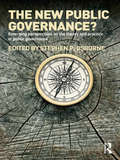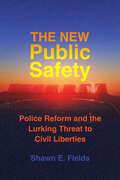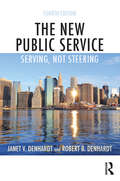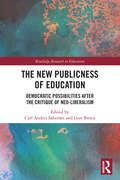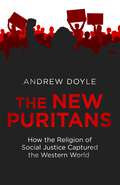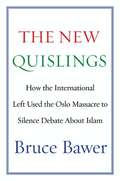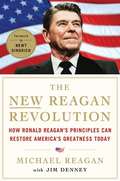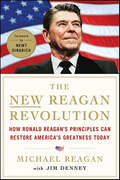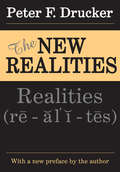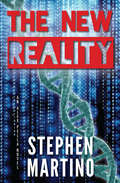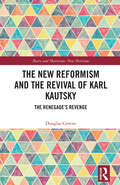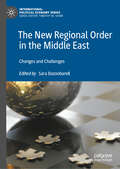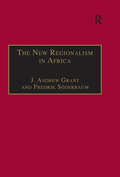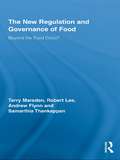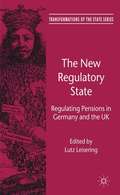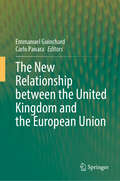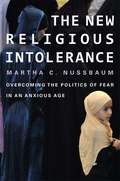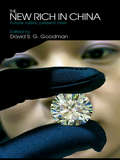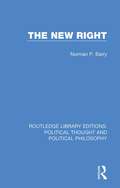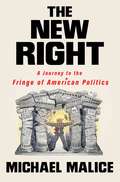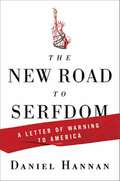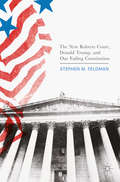- Table View
- List View
The New Public Governance?: Emerging Perspectives on the Theory and Practice of Public Governance
by Stephen P. OsborneDespite predictions that 'new public management' would establish itself as the new paradigm of Public Administration and Management, recent academic research has highlighted concerns about the intra-organizational focus and limitations of this approach. This book represents a comprehensive analysis of the state of the art of public management, examining and framing the debate in this important area. The New Public Governance? sets out to explore this emergent field of research and to present a framework with which to understand it. Divided into five parts, the book examines: Theoretical underpinnings of the concept of governance, especially competing perspectives from Europe and the US Governance of inter-organizational partnerships and contractual relationships Governance of policy networks Lessons learned and future directions Under the steely editorship of Stephen Osborne and with contributions from leading academics including Owen Hughes, John M. Bryson, Don Kettl, Guy Peters and Carsten Greve, this book will be of particular interest to researchers and students of public administration, public management, public policy and public services management.
The New Public Safety: Police Reform and the Lurking Threat to Civil Liberties
by Shawn E. FieldsEfforts to reduce reliance on police have gained momentum since 2020, driven by a growing recognition that public safety is better served when addressed by experts in medicine, mental health, houselessness, and behavior intervention. But this rush to reimagine public safety carries a serious risk: a long history of abuse exists within social welfare systems, and the laws protecting us from police who perpetrate these types of abuses largely do not apply to EMTs, social workers, and other nonpolice responders. While commending efforts to remove police from places they do not belong, The New Public Safety: Police Reform and the Lurking Threat to Civil Liberties raises the alarm on the dangers these reforms can pose if undertaken without proper restraints and protections and offers practical, achievable solutions to address these threats.
The New Public Service: Serving, Not Steering
by Robert B. Denhardt Janet V. DenhardtThe New Public Service: Serving, not Steering provides a framework for the many voices calling for the reaffirmation of democratic values, citizenship, and service in the public interest. It is organized around a set of seven core principles: (1) serve citizens, not customers; (2) seek the public interest; (3) value citizenship and public service above entrepreneurship; (4) think strategically, act democratically; (5) recognize that accountability isn't simple; (6) serve, rather than steer; and (7) value people, not just productivity. The New Public Service asks us to think carefully and critically about what public service is, why it is important, and what values ought to guide what we do and how we do it. It celebrates what is distinctive, important, and meaningful about public service and considers how we might better live up to those ideals and values. The revised fourth edition includes a new chapter that examines how the role and significance of these New Public Service values have expanded in practice and research over the past 15 years. Although the debate about governance will surely continue for many years, this compact, clearly written volume both provides an important framework for a public service based on citizen discourse and the public interest and demonstrates how these values have been put into practice. It is essential reading fo students and serious practitioners in public administration and public policy.
The New Publicness of Education: Democratic Possibilities After the Critique of Neo-Liberalism (Routledge Research in Education)
by Gert Biesta Carl Anders SäfströmThis book explores democratic possibilities for education after the critique of the impact of neo-liberalism on educational policy and practice. Together, the authors investigate the contours of a ‘new publicness’ of education. This edited volume refers to well-established critiques that expose how neoliberal governance has normalised the privatisation of public life and undermined the public nature of education. Through historical reconstruction, theoretical exploration, and analyses of educational policies and practices, chapters take a novel approach by investigating democratic possibilities within and beyond the current neoliberal hegemony in education. Covering a range of educational settings – from early childhood education through to higher and professional education – chapters spotlight the Irish educational and political context, as well as exploring international implications. Ultimately, this book opens up new avenues for discussion around public education and its future, and will therefore be of great interest to researchers and students in the fields of educational theory, education politics, educational policy and democratic education.
The New Puritans: How the Religion of Social Justice Captured the Western World
by Andrew Doyle'A sober but devastating skewering of cancel culture and the moral certainties it shares with religious fundamentalism' Sunday TimesEngaging, incisive and acute, The New Puritans is a deeply necessary exploration of our current cultural climate and an urgent appeal to return to a truly liberal society. The puritans of the seventeenth century sought to refashion society in accordance with their own beliefs, but they were deep thinkers who were aware of their own fallibility. Today, in the grasp of the new puritans, we see a very different story.Leading a cultural revolution driven by identity politics and so-called 'social justice', the new puritanism movement is best understood as a religion - one that makes grand claims to moral purity and tolerates no dissent. Its disciples even have their own language, rituals and a determination to root out sinners through what has become known as 'cancel culture'. In The New Puritans, Andrew Doyle powerfully examines the underlying belief-systems of this ideology, and how it has risen so rapidly to dominate all major political, cultural and corporate institutions. He reasons that, to move forward, we need to understand where these new puritans came from and what they hope to achieve. Written in the spirit of optimism and understanding, Doyle offers an eloquent and powerful case for the reinstatement of liberal values and explains why it's important we act now.
The New Puritans: How the Religion of Social Justice Captured the Western World
by Andrew Doyle'A sober but devastating skewering of cancel culture and the moral certainties it shares with religious fundamentalism' Sunday TimesEngaging, incisive and acute, The New Puritans is a deeply necessary exploration of our current cultural climate and an urgent appeal to return to a truly liberal society. The puritans of the seventeenth century sought to refashion society in accordance with their own beliefs, but they were deep thinkers who were aware of their own fallibility. Today, in the grasp of the new puritans, we see a very different story.Leading a cultural revolution driven by identity politics and so-called 'social justice', the new puritanism movement is best understood as a religion - one that makes grand claims to moral purity and tolerates no dissent. Its disciples even have their own language, rituals and a determination to root out sinners through what has become known as 'cancel culture'. In The New Puritans, Andrew Doyle powerfully examines the underlying belief-systems of this ideology, and how it has risen so rapidly to dominate all major political, cultural and corporate institutions. He reasons that, to move forward, we need to understand where these new puritans came from and what they hope to achieve. Written in the spirit of optimism and understanding, Doyle offers an eloquent and powerful case for the reinstatement of liberal values and explains why it's important we act now.
The New Puritans: How the Religion of Social Justice Captured the Western World (Language Acts and Worldmaking #18)
by Andrew Doyle'A sober but devastating skewering of cancel culture and the moral certainties it shares with religious fundamentalism' Sunday Times'Andrew Doyle has written a masterful broadside against the woke that will also discomfit the anti-woke, proposing to both the radical notion that rather than being identities, we embrace our status as individuals' CriticEngaging, incisive and acute, The New Puritans is a deeply necessary exploration of our current cultural climate and an urgent appeal to return to a truly liberal society. The puritans of the seventeenth century sought to refashion society in accordance with their own beliefs, but they were deep thinkers who were aware of their own fallibility. Today, in the grasp of the new puritans, we see a very different story.Leading a cultural revolution driven by identity politics and so-called 'social justice', the new puritanism movement is best understood as a religion - one that makes grand claims to moral purity and tolerates no dissent. Its disciples even have their own language, rituals and a determination to root out sinners through what has become known as 'cancel culture'. In The New Puritans, Andrew Doyle powerfully examines the underlying belief-systems of this ideology, and how it has risen so rapidly to dominate all major political, cultural and corporate institutions. He reasons that, to move forward, we need to understand where these new puritans came from and what they hope to achieve. Written in the spirit of optimism and understanding, Doyle offers an eloquent and powerful case for the reinstatement of liberal values and explains why it's important we act now.
The New Quislings
by Bruce BawerMillions of people around the world were shocked and horrified when a madman named Anders Behring Breivik set off a bomb in downtown Oslo and then attacked a political summer camp on the island of Utoya, gunning down defenseless teenagers while calling out "Gotcha!" as though he were playing a video game. In the immediate aftermath of the attack, before the killer's identity was known, some people leaped to the conclusion that this was yet another act of Islamic terrorism. When it turned out that the killer was a native Norwegian-the author of a rambling manifesto in which he described himself as a modern Knight Templar defending the values of Christian civilization-the left wing cultural elite in Europe and the US jumped to delegitimize critics of Islam by falsely and cynically linking them to Breivik. One of those critics was American writer Bruce Bawer, author of numerous books about the threat of Islamic radicalism and one of those whose works were cited in Breivik's manifesto. Bawer has lived in Oslo for many years and has written extensively on the challenges of immigration and the negative effects of radical Islam on liberal societies. He is also a vocal critic of the left wing cultural elite that seeks to minimize this threat and promotes instead a vision of a harmonious multicultural society based on tolerance and mutual respect. Unfortunately, such "tolerance" does not extend to critics of Islam or multiculturalism, who are routinely labeled nativists and fascists by members of the left wing elite. The left typically denies or downplays the religious motives of Islamic terrorists while insisting that "right wing rhetoric" creates a "climate of hate" which necessarily leads to violence. Thus the multicultural left in Europe and the US strove to paint Breivik as a pro-Israel Christian terrorist whose insane actions were encouraged if not outright motivated by conservative authors who warn against the impending Islamization of Europe. Those who had criticized Islam, however legitimately concerned they might be with the denial of basic human rights and individual liberties within Muslim communities, were deemed officially anathema. They were Islamophobes-racists, bigots, extremists. They were the danger. They were the threat. They had fertilized the soil in which the mass murderer had grown. This campaign of vilification was waged not just in the European press but on American blogs and in the pages of the New York Times. In The New Quislings, Bruce Bawer explores the world-wide response to Breivik's rampage, from the Norwegian cultural elite to Atlantic blogger Andrew Sullivan and the New York Times' Roger Cohen. He provides a fascinating portrait of the left-wing cultural elite in Norway-revealed to be the birthplace of political correctness-and shows how they have become apologists for radical Islam. Bawer further argues that they are the heirs of Vidkun Quisling, the Norwegian fascist who administered Norway under the heel of the Nazi regime. And he explains how those who oppose open debate and seek to control the conversation about Islam pose the greatest threat to liberal society.
The New Reagan Revolution: How Ronald Reagan's Principles Can Restore America's Greatness
by Newt Gingrich Jim Denney Michael ReaganThe challenges and threats we as a nation face today are eerily similar to the conditions in the world before the beginning of the Reagan era. In his famous 1976 speech at the Republican National Convention, Ronald Reagan helped define a way forward and strengthened the Republican Party. As we stand at a crossroad once again, we are fortunate to have a blueprint for restoring America's greatness. Reagan has given us the principles to succeed. This book is not merely a diagnosis of our nation's ills, but a prescription to heal our nation, rooted in the words and principles of Ronald Reagan. In these pages, Michael Reagan shares the plan his father developed over years of study, observation, and reflection. It is the plan he announced to the nation, straight from his heart, one summer evening during America's 200th year. It's the plan he put into action during his eight years in office as one of the most effective presidents of the 20th century, and it is the plan we can use today to help return America to its former greatness, soundness, and prosperity.
The New Reagan Revolution: How Ronald Reagan's Principles Can Restore America's Greatness
by Jim Denney Michael Reagan"There are cynics who say that a party platform is something that no one bothers to read and it doesn't very often amount to much. Whether it is different this time than it has ever been before, I believe the Republican Party has a platform that is a banner of bold, unmistakable colors, with no pastel shades." –Ronald Reagan, 1976 Republican National Convention When Ronald Reagan was called to the podium by President Ford during the 1976 Republican National Convention, he had no prepared remarks. But the unrehearsed speech he gave that night is still regarded as one of the most moving speeches of his political career. The reason he was able to give such a powerful speech on a moment's notice was that he was proclaiming the core principles of his heart and soul, which he had been teaching and preaching for years.The New Reagan Revolution reveals new insights into the life, thoughts, and actions of the man who changed the world during the 1980s. The challenges and threats we face today are eerily similar to the conditions in the world before the beginning of the Reagan era. The good news is that we already know what works. Ronald Reagan has given us the blueprint. This book is not merely a diagnosis of our nation's ills, but a prescription to heal our nation, rooted in the words and principles of Ronald Reagan. In these pages, you'll find a plan for returning America to its former greatness, soundness, and prosperity. It's the plan Ronald Reagan developed over years of study, observation, and reflection. It's a plan he announced to the nation, straight from his heart, one summer evening during America's 200th year. It's the plan he put into action during his eight years in office as the most effective president of the 20th century, and it is the plan we can use today to help return America to its former greatness, soundness, and prosperity.
The New Realities: In Government And Politics, In Economics And Business, In Society And World View
by William A. DonohueEven in the flattest landscape there are passes where the road first climbs to a peak and then descends into a new valley. Most of these passes are simply topography with little or no difference in climate, language, or culture between the valleys on either side. But some passes are different: they are true divides. History too knows such divides. Once these divides have been crossed, the social and political landscape changes; the social and political climate is different, and so is the social and political language. Some time between 1965 and 1973 we passed over such a divide and entered ""the next century.""Challenging, insightful, and provocative, Peter Drucker's The New Realities anticipates the central issues of a rapidly changing world. When it was initially published, in 1989, some reviewers mistakenly thought The New Realities was a book about the future, or in other words, a series of predictions. But, as indicated in the title, the book discusses realities. Drucker argues that events of the next thirty to forty years, or even further on, had already largely been defined by events of the previous half-century. Thus, Drucker discusses episodes in world history that had not yet happened at the time of the book's initial publication, such as: the archaism of the hope for ""salvation by society"" in ""The End of FDR's America""; the democratization of the Soviet Union in ""When the Russian Empire is Gone""; the technology boom of the 1990s in ""The Information-Based Organization""; and the evolution of management in ""Management as Social Function and Liberal Art.""Graced with a new preface by the author that discusses both reactions to the original publication of the book and how important it is for decision-makers to consider the past and present when planning for the future, The New Realities is mandatory reading for understanding politics, government, the economy, information technology, and business in an ever-chan
The New Reality: An Alex Pella Novel (Alex Pella #1)
by Stephen MartinoAuthor Stephen Martino delivers an action-packed medical thriller in a heart-stopping race to save humanity. In the year 2080, a deadly retrovirus is inadvertently released upon the planet. Facing financial ruin and catastrophic loss of life, the world's nations turn to acclaimed neuroscientist Alex Pella and NIH expert Marissa Ambrosia. Assembling a team of experts, the scientists begin an international search for the cure while fighting off a foreign elite military unit sent to stop them at all costs. Guided by a code concealed within the Hebrew text of the Old Testament, the scientists must traverse ancient lands and solve a biblical riddle in their quest to save humanity from its eminent destruction. Drawing from both our nation's politically charged environment and the worldwide economic crisis, The New Reality follows Alex Pella on a journey that projects a frightening path for human existence in the twenty-first century.
The New Reformism and the Revival of Karl Kautsky: The Renegade’s Revenge (Marx and Marxisms)
by Douglas GreeneThis text offers an authoritative historiography of German socialist theorist Karl Kautsky and his impact on debates about the Russian Revolution and the contemporary left. Known as the “Pope of Marxism,” Douglas Greene examines the totality of Kautsky’s political career and dissects the fundamental opportunism and passive radicalism that defined his Marxism. He later examines the most substantive Marxist critics of Kautsky, namely Rosa Luxemburg, V. I. Lenin, and Leon Trotsky, while offering a critical assessment of the work produced by scholars and activists, Lars Lih, Eric Blanc, and Mike Mcnair, seeking to revive Kautsky. The New Reformism and the Revival of Karl Kautsky is an important addition to scholarship on the subject and a valuable resource for those interested in the Russian Revolution, German politics, socialism, Marxism, and contemporary left-wing debates.
The New Regional Order in the Middle East: Changes and Challenges (International Political Economy Series)
by Sara BazoobandiThis book examines some of the driving forces of change in the Middle East and aims to provide a regional outlook. The political and social events of the past years have significantly affected the regional structure across the Middle East, evident in socio-economic systems, security framework and the balance of power across the area. Each chapter focuses on one of the driving forces of change, including the Iran Nuclear Deal, the role of external powers, energy and its political and economic role in the region, the regional balance of power struggle amongst the key regional players and the socio-economic challenges across the region.
The New Regionalism in Africa (The International Political Economy of New Regionalisms Series)
by Fredrik SöderbaumThis edited volume transcends conventional state-centric and formalistic notions of regionalism and theorizes, conceptualizes and analyzes the complexities and contradictions of regionalization processes in contemporary Africa. The collection not only unpacks and theorizes the African state-society complex with regard to new regionalism, but also explicitly integrates the often neglected discourse of human security and human development. In so doing, the book moves the discussion of new regionalism forward at the same time as it adds important insights to security and development. It is organized into three parts. Part I theorizes, conceptualizes and analyzes the new regionalism in Africa from the point of view of the region (e.g. West, East, Central and Southern Africa). The national perspectives in Part II focus on the new regionalism in Africa from the point of view of particular countries or specific state-society complexes, such as Kenya, the Democratic Republic of the Congo (DRC), the enclave of Cabinda, Angola and Zambia. Part III contains two concluding chapters that tie the main threads of the volume together, theoretically and empirically, and discuss the contribution of the analytical framework, the new regionalism approach (NRA) to the larger study of regionalism.
The New Regulation and Governance of Food: Beyond the Food Crisis? (Routledge Studies in Human Geography)
by Robert Lee Terry Marsden Andrew Flynn Samarthia ThankappanMajor questions surround who, how, and by what means should the interests of government, the private sector, or consumers hold authority and powers over decisions concerning the production and consumption of foods. This book examines the development of food policy and regulation following the BSE (mad cow disease) crisis of the late 1990s, and traces the changing relationships between three key sets of actors: private interests, such as the corporate retailers; public regulators, such as the EU directorates and UK agencies; and consumer groups at EU and national levels. The authors explore how these interests deal with the conundrum of continuing to stimulate a corporately organised and increasingly globalised food system at the same time as creating a public and consumer-based legitimate framework for it. The analysis develops a new model and synthesis of food policy and regulation which reassesses these public/private sector responsibilities with new evidence and theoretical insights.
The New Regulatory State
by Lutz LeiseringExplores the role of governments in creating and regulating private pensions in the UK and Germany since the 1980s. Private pensions have given rise to a new regulatory state in this area. The contributing authors compare pension regulation and utility regulation, while others analyse the regulatory role of the EU.
The New Relationship between the United Kingdom and the European Union
by Carlo Panara Emmanuel GuinchardBrexit has reshuffled the cards of the relationship between the United Kingdom and the European Union. It is a one in a lifetime event, which ended nearly 50 years of EU Membership. EU law as such no longer applies in the United Kingdom and British citizens and companies no longer benefit from its advantages. Part of the previous regime has however been maintained (at times with amendments) through the series of treaties negotiated between the UK and the EU in 2019 and 2020, in particular the Trade and Cooperation Agreement of 2020, to which the 2023 Windsor Agreement can be added. The end result is a legal regime which is perhaps even more complex than EU law itself. This book aims to provide the reader with a clarification of this legal regime as well as provide context to it and suggestions to improve it. All key topics are covered, such as citizens of the EU in the UK and British citizens in the EU, trade in goods and in services, criminal justice, public procurement, Northern Ireland, the UK overseas territories, the dispute settlement, security and defence, international trade agreements of the UK post-Brexit, environmental protection, European civil justice, financial services, education and research, and the European offices of the UK local authorities and devolved administrations after Brexit. All the chapters follow, wherever possible, the same triadic structure. The first part looks at the regime prior to Brexit; the second part analyses the current regime; and the third part discusses ongoing and predictable trends. The concluding chapter attempts to identify some themes likely to impact on the forthcoming preparation of the 2026 review.
The New Religious Intolerance: Overcoming the Politics of Fear in an Anxious Age
by Martha C. NussbaumWhat impulse prompted some newspapers to attribute the murder of 77 Norwegians to Islamic extremists, until it became evident that a right-wing Norwegian terrorist was the perpetrator? Why did Switzerland, a country of four minarets, vote to ban those structures? How did a proposed Muslim cultural center in lower Manhattan ignite a fevered political debate across the United States? In The New Religious Intolerance, Martha C. Nussbaum surveys such developments and identifies the fear behind these reactions. Drawing inspiration from philosophy, history, and literature, she suggests a route past this limiting response and toward a more equitable, imaginative, and free society. Fear, Nussbaum writes, is “more narcissistic than other emotions. ” Legitimate anxieties become distorted and displaced, driving laws and policies biased against those different from us. Overcoming intolerance requires consistent application of universal principles of respect for conscience. Just as important, it requires greater understanding. Nussbaum challenges us to embrace freedom of religious observance for all, extending to others what we demand for ourselves. She encourages us to expand our capacity for empathetic imagination by cultivating our curiosity, seeking friendship across religious lines, and establishing a consistent ethic of decency and civility. With this greater understanding and respect, Nussbaum argues, we can rise above the politics of fear and toward a more open and inclusive future.
The New Rich in China: Future rulers, present lives
by David S. G. GoodmanThree decades of reform since 1978 in the People’s Republic of China have resulted in the emergence of new social groups which have included new occupations and professions generated as the economy has opened up and developed and, most spectacularly given the legacy of state socialism, the identification of those who are regarded as wealthy. However, although China’s new rich are certainly a consequence of globalization, there remains a need for caution in assuming either that China’s new rich are a middle class, or that if they are they should immediately be equated with a universal middle class. Including sections on class, status and power, agency and structure and lifestyle The New Rich in China investigates the political, socio-economic and cultural characteristics of the emergent new rich in China, the similarities and differences to similar phenomenon elsewhere and the consequences of the new rich for China itself. In doing so it links the importance of China to the world economy and helps us understand how the growth of China’s new rich may influence our understanding of social change elsewhere. This is a subject that will become increasingly important as China continues its development and private entrepreneurship continues to be encouraged and as such The New Rich in China will be an invaluable volume for students and scholars of Chinese studies, history and politics and social change.
The New Right (Routledge Library Editions: Political Thought and Political Philosophy #3)
by Norman P. BarryFirst published in 1987. Towards the end of the twentieth century there was a resurgence of thinking about politics, economics and society referred to variously as the 'New Right’, the radical right, neo-conservatism, economic liberalism or libertarianism. Although the New Right is not a single coherent movement it represented a clear alternative to the prevailing social-democratic consensus and had had considerable influence on government policy in both America and Britain. This book presents an introductory survey of the New Right worldwide. It examines the varieties of free-market and 'monetarist' economic thought and introduces the reader to the public-choice critique of public policy. In political philosophy the book analyses American and British conservative thought and compares conservatism with neo-liberalism. The author pays particular attention to the New Right’s analysis of constitutionalism and its critique of the dominance of ’politics’ over ’economics' during the high-point of the consensus period. The author assesses the success which the different schools of the New Right have had in influencing public opinion and in the formation of government policy. He does not argue for or against the New Right but presents a dispassionate survey from which the reader can draw his or her own conclusions.
The New Right in the New Europe: Czech Transformation and Right-Wing Politics, 1989–2006 (BASEES/Routledge Series on Russian and East European Studies)
by Seán HanleyThis book considers the emergence of centre right parties in Eastern Europe following the fall of communism, focusing primarily on the case of the Czech Republic. Although the country with the strongest social democratic traditions in Eastern Europe, the Czech Republic also produced the region’s strongest and most durable party of the free market right in Václav Klaus’ Civic Democratic Party (ODS). Seán Hanley considers the different varieties of right-wing politics that emerged in post-communist Europe, exploring in particular detail the origins of the Czech neo-liberal right, tracing its genesis to the reactions of dissidents and technocrats to the collapse of 1960s reform communism. He argues that, rather than being shaped by distant historical legacies, the emergence of centre-right parties can best be understood by examining the responses of counter-elites, outside or marginal to the former communist party-state establishment, to the collapse of communism and the imperatives of market reform and decommunization. This volume goes on to consider the emergence of right-wing forces in the disintegrating Civic Forum movement in 1990, the foundation of the ODS, the right’s period in office under Klaus in 1992-97, and its subsequent divisions and decline. It concludes by analyzing the ideology of the Czech Right, and its growing euroscepticism.
The New Right: A Journey to the Fringe of American Politics
by Michael MaliceThe definitive firsthand account of the movement that permanently broke the American political consensus.What do internet trolls, economic populists, white nationalists, techno-anarchists and Alex Jones have in common? Nothing, except for an unremitting hatred of evangelical progressivism and the so-called “Cathedral” from whence it pours forth.Contrary to the dissembling explanations from the corporate press, this movement did not emerge overnight—nor are its varied subgroups in any sense interchangeable with one another. As united by their opposition as they are divided by their goals, the members of the New Right are willfully suspicious of those in the mainstream who would seek to tell their story. Fortunately, author Michael Malice was there from the very inception, and in The New Right recounts their tale from the beginning.Malice provides an authoritative and unbiased portrait of the New Right as a movement of ideas—ideas that he traces to surprisingly diverse ideological roots. From the heterodox right wing of the 1940s to the Buchanan/Rothbard alliance of 1992 and all the way through to what he witnessed personally in Charlottesville, The New Right is a thorough firsthand accounting of the concepts, characters and chronology of this widely misunderstood sociopolitical phenomenon.Today’s fringe is tomorrow’s orthodoxy. As entertaining as it is informative, The New Right is required reading for every American across the spectrum who would like to learn more about the past, present and future of our divided political culture.
The New Road to Serfdom: A Letter of Warning to America
by Daniel HannanA prominent British conservative warns Americans to stop President Obama from leading their country down the path to European-style socialism.In March 2009, British conservative Daniel Hannan became a celebrity overnight when he assailed prime minister Gordon Brown on the floor of the European Parliament. The YouTube clip went viral, leading to whirlwind appearances on FOX News and other conservative media outlets. A thoughtful and articulate spokesman for conservative ideas, Hannan is better versed in America's traditions and founding documents than many Americans are. In The New Road to Serfdom, Hannan argues forcefully and passionately that Americans must not allow Barack Obama to take them down the road to European Union–style social democracy. He pleads with Americans not to abandon the founding principles that have made their country a beacon of liberty for the rest of the world.
The New Roberts Court, Donald Trump, and Our Failing Constitution
by Stephen M. FeldmanThis book examines what Supreme Court Justice Antonin Scalia's death and Judge Neil Gorsuch's appointment means for the future of democracy in America. Before Scalia's death, the five conservative justices of the Roberts Court--John Roberts, Clarence Thomas, Samuel Alito, Anthony Kennedy, and Antonin Scalia--stamped a capitalized version of democracy, discussed in this book as Democracy, Inc. , with a constitutional imprimatur. The justices believed they were upholding the American way of life, but they instead placed our democratic-capitalist system in its gravest danger since World War II. Democracy, Inc. not only contravenes the framers' vision of a system balanced between the public and private spheres, government power and individual rights, but also threatens the very survival of American constitutionalism. With the looming confirmation of Gorsuch, the new Court must choose: will it follow the early Roberts Court in approving and bolstering Democracy, Inc. , or will it restore the crucial balance between the public and private spheres in our democratic-capitalist system?
